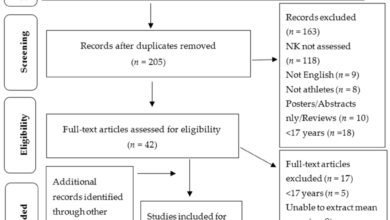
Why Your Weight Fluctuates: Unraveling the Mystery
Why your weight fluctuates is a question that many of us have pondered at some point. It’s frustrating to see the scale jump around, even when we feel like we’re doing everything right. The truth is, weight fluctuations are a common occurrence, and they can be influenced by a wide range of factors, from hormonal changes to dietary choices and even the amount of sleep we get.
This journey will explore the intricate dance of weight fluctuations, uncovering the hidden factors that can make the scale fluctuate, and empowering you to understand and manage your weight more effectively.
From the complex interplay of hormones and the impact of stress to the role of medication and water retention, we’ll delve into the various factors that contribute to weight fluctuations. We’ll also examine the impact of dietary choices, including meal timing, calorie intake, and macronutrient composition.
Understanding these factors will equip you with the knowledge to navigate the ups and downs of weight fluctuations with greater confidence and control.
Factors Influencing Weight Fluctuation

It’s normal for your weight to fluctuate from day to day or even week to week. Several factors can influence these changes, and understanding them can help you navigate your weight journey more effectively.
Hormonal Influences on Weight
Hormones play a significant role in regulating appetite, metabolism, and body composition. For women, hormonal fluctuations throughout the menstrual cycle, pregnancy, and menopause can impact weight.
- Estrogen: This hormone influences fat distribution and can cause water retention, leading to temporary weight gain. During menstruation, estrogen levels drop, which can lead to increased appetite and weight gain.
- Progesterone: This hormone promotes fat storage, especially around the hips and thighs. It can also cause water retention and bloating.
- Thyroid Hormones: These hormones regulate metabolism. An underactive thyroid (hypothyroidism) can slow down metabolism, leading to weight gain. Conversely, an overactive thyroid (hyperthyroidism) can speed up metabolism, leading to weight loss.
Stress and Sleep
Chronic stress and poor sleep can significantly impact weight fluctuations.
- Stress: When you’re stressed, your body releases cortisol, a hormone that promotes fat storage, especially in the abdominal area. Stress can also lead to emotional eating, which can contribute to weight gain.
- Sleep: When you don’t get enough sleep, your body produces more of the hunger hormone ghrelin and less of the satiety hormone leptin. This can lead to increased appetite and cravings, contributing to weight gain.
Medication and Weight, Why your weight fluctuates
Certain medications can cause weight gain or loss as a side effect.
- Antidepressants: Some antidepressants, such as selective serotonin reuptake inhibitors (SSRIs), can cause weight gain due to their effects on appetite and metabolism.
- Corticosteroids: These medications are often used to treat inflammation and autoimmune diseases. They can cause weight gain by increasing appetite and promoting fat storage.
- Antipsychotics: Some antipsychotics can cause weight gain due to their effects on appetite and metabolism.
Water Retention
Water retention can cause temporary weight fluctuations. This can be due to hormonal changes, high salt intake, or certain medical conditions.
- Hormonal Changes: As mentioned earlier, estrogen and progesterone can cause water retention.
- High Salt Intake: Sodium attracts water, so a high salt intake can lead to water retention.
- Medical Conditions: Certain medical conditions, such as kidney disease, heart failure, and liver disease, can cause water retention.
Muscle Mass and Weight
Muscle weighs more than fat, so an increase in muscle mass can lead to a higher number on the scale, even if you’re losing fat. This is a positive change, as muscle is metabolically active and helps burn calories.
Dietary Factors

Dietary choices play a crucial role in weight fluctuations. The food we eat, how much we consume, and the timing of our meals can significantly impact our weight. Understanding the nuances of dietary factors is essential for managing weight effectively.
Meal Timing and Frequency
The timing and frequency of meals can influence weight fluctuations. Studies have shown that eating later in the day can lead to weight gain, potentially due to hormonal changes and reduced energy expenditure. Conversely, eating more frequently throughout the day, such as with smaller meals or snacks, can help regulate blood sugar levels and prevent overeating.
Calorie Intake and Expenditure
The fundamental principle of weight management is the balance between calorie intake and expenditure. When we consume more calories than we burn, our body stores excess energy as fat, leading to weight gain. Conversely, if we burn more calories than we consume, our body utilizes stored fat for energy, resulting in weight loss.
The energy balance equation:Weight change = Calories consumed
Calories expended
Macronutrient Composition
The composition of our diet, particularly the balance of carbohydrates, proteins, and fats, can affect weight changes. Carbohydrates are the body’s primary source of energy, but excess consumption can lead to weight gain. Protein is essential for building and repairing tissues, and it can promote satiety, potentially aiding in weight management.
Fats are important for various bodily functions, but high-fat diets can contribute to weight gain if not balanced with adequate calorie expenditure.
Processed Foods and Whole Foods
Processed foods are often high in calories, sugar, and unhealthy fats, which can contribute to weight gain. They are also generally less nutrient-dense than whole foods. Whole foods, such as fruits, vegetables, lean proteins, and whole grains, are naturally nutrient-rich and can promote satiety, making them beneficial for weight management.
Dietary Approaches and Weight Fluctuations
Different dietary approaches can influence weight fluctuations. Here’s a table outlining the potential weight fluctuations associated with some popular dietary approaches:| Dietary Approach | Potential Weight Fluctuation ||—|—|| Ketogenic Diet | Rapid weight loss in the initial phase due to water loss, followed by slower weight loss as the body adapts to using fat as fuel.
|| Intermittent Fasting | Weight loss can vary depending on the specific fasting protocol. Some studies suggest potential benefits for weight management, but more research is needed. || Mediterranean Diet | Generally promotes weight loss due to its focus on whole foods, fruits, vegetables, and healthy fats.
|| DASH Diet | Can aid in weight management due to its emphasis on fruits, vegetables, and low-fat dairy products. |
Lifestyle Factors

Lifestyle factors play a significant role in weight fluctuations. Our daily routines, habits, and choices can influence our energy balance, ultimately affecting our weight. Let’s delve into some key lifestyle factors that can contribute to weight changes.
Ever feel like your weight goes up and down for no reason? It’s actually pretty common! It could be due to things like water retention, muscle gain, or even hormonal changes. If you’re looking to increase your carb intake in a healthy way, check out this article on how to increase carbs with healthy options.
Knowing what foods to eat and when can make a big difference in managing those fluctuations and feeling your best.
Physical Activity Levels
Regular physical activity is crucial for maintaining a healthy weight. When we exercise, we burn calories, which helps us maintain or lose weight. Conversely, a sedentary lifestyle can lead to weight gain. The amount of physical activity needed to maintain a healthy weight varies from person to person, depending on factors such as age, gender, and overall health.
The more active we are, the more calories we burn, leading to potential weight loss.
For example, a study published in the Journal of the American Medical Association found that adults who engaged in at least 150 minutes of moderate-intensity aerobic activity per week were less likely to gain weight than those who were less active.
Alcohol Consumption
Alcohol is calorie-dense and can contribute to weight gain. It’s important to be mindful of our alcohol intake, as excessive consumption can lead to an increase in calorie intake and potential weight fluctuations.
Alcohol can also affect our metabolism and hormonal balance, further contributing to weight changes.
For instance, a study published in the journal Alcoholism: Clinical and Experimental Research found that people who consumed more than two alcoholic drinks per day were more likely to be overweight or obese than those who drank less.
Ever wonder why your weight seems to bounce around even when you think you’re eating the same? It’s likely a combination of factors, including water retention, muscle gain, and even the way your body processes food. If you’re looking for some comforting and calorie-conscious options, check out these 9 hearty winter soups under 360 calories.
They’re a great way to stay warm and satisfied without overdoing it, which can help keep your weight fluctuations in check.
Travel and Changes in Routine
Travel and changes in our daily routines can disrupt our eating and exercise habits, leading to weight fluctuations. When we travel, we may have less control over our food choices, and we may be less likely to exercise regularly.
These disruptions in our normal routine can lead to an increase in calorie intake and a decrease in calorie expenditure, contributing to weight gain.
For example, a study published in the journal Obesity found that people who traveled frequently were more likely to gain weight than those who did not travel as often.
Lifestyle Habits for Weight Stabilization
Here are some lifestyle habits that can help stabilize weight:
- Regular Exercise:Aim for at least 30 minutes of moderate-intensity aerobic activity most days of the week. This could include brisk walking, jogging, swimming, or cycling.
- Balanced Diet:Choose a diet rich in fruits, vegetables, whole grains, and lean protein. Limit processed foods, sugary drinks, and unhealthy fats.
- Adequate Sleep:Aim for 7-8 hours of sleep per night. Sleep deprivation can disrupt hormones that regulate hunger and metabolism.
- Stress Management:Stress can lead to overeating and weight gain. Find healthy ways to manage stress, such as exercise, yoga, or meditation.
- Hydration:Drink plenty of water throughout the day. Water can help you feel full, which can reduce your overall calorie intake.
- Mindful Eating:Pay attention to your hunger cues and eat slowly. This can help you avoid overeating and make healthier food choices.
Understanding Weight Fluctuation Patterns
Weight fluctuations are a common occurrence, and understanding the patterns behind these changes can help you make informed decisions about your health and wellness. Identifying the causes of these fluctuations can empower you to manage your weight effectively.
Daily Weight Fluctuations
Daily weight fluctuations are normal and often attributed to factors such as fluid intake, food consumption, and physical activity. These fluctuations can range from a few pounds to even a pound or two.
Ever feel like your weight is a rollercoaster? It’s common! Factors like stress, sleep, and even your menstrual cycle can play a role. But don’t let fluctuations get you down. Finding a sustainable approach that works for you is key, and that often involves making smart choices about what you eat.
Check out some diets and recipes for 35 minute dinners that can help you nourish your body without sacrificing time. Remember, consistency and a balanced approach are what really make a difference in the long run, not quick fixes.
- Fluid Intake:Water retention, especially after consuming a large amount of fluids or salty foods, can lead to temporary weight gain. Conversely, dehydration can cause a temporary decrease in weight.
- Food Consumption:The amount and type of food consumed throughout the day can affect daily weight fluctuations. For example, a large meal can cause a temporary weight increase due to the food’s weight and the water content in the digestive system.
- Physical Activity:Exercise can lead to temporary weight loss due to water loss through sweat. The intensity and duration of the exercise can influence the extent of weight fluctuation.
Weekly Weight Fluctuations
Weekly weight fluctuations are often influenced by dietary changes, menstrual cycles, and stress levels. These fluctuations can be more pronounced than daily variations.
- Dietary Changes:Changes in diet, such as adopting a new eating plan or indulging in a weekend binge, can significantly impact weekly weight fluctuations.
- Menstrual Cycle:Hormonal changes during the menstrual cycle can cause water retention and bloating, leading to temporary weight gain.
- Stress Levels:Stress can trigger hormonal changes that influence appetite and metabolism, potentially leading to weight gain or loss.
Monthly Weight Fluctuations
Monthly weight fluctuations can be influenced by hormonal changes, dietary habits, and seasonal factors. These fluctuations can be more substantial than daily or weekly variations.
- Hormonal Changes:Fluctuations in hormones, particularly during the menstrual cycle, pregnancy, or menopause, can affect weight.
- Dietary Habits:Monthly weight fluctuations can be attributed to dietary changes, such as seasonal variations in food intake or changes in eating patterns.
- Seasonal Factors:Changes in weather and activity levels can affect weight. For example, people may tend to eat more during the winter months or engage in more outdoor activities during the summer.
| Weight Fluctuation Pattern | Potential Causes |
|---|---|
| Daily | Fluid intake, food consumption, physical activity |
| Weekly | Dietary changes, menstrual cycle, stress levels |
| Monthly | Hormonal changes, dietary habits, seasonal factors |
Strategies for Managing Weight Fluctuations: Why Your Weight Fluctuates
Managing weight fluctuations is an essential aspect of overall health and well-being. Understanding the causes and patterns of your weight fluctuations is the first step toward effective management. By implementing strategies that address these underlying factors, you can work towards achieving a more consistent weight and improving your overall health.
Maintaining a Consistent Weight
Maintaining a consistent weight involves adopting healthy habits that promote a balanced energy intake and expenditure. This includes consuming a nutritious diet, engaging in regular physical activity, and getting adequate sleep.
- Consume a balanced diet: A balanced diet rich in fruits, vegetables, whole grains, and lean protein provides essential nutrients and helps regulate energy levels. Limiting processed foods, sugary drinks, and excessive amounts of saturated and unhealthy fats is crucial.
- Engage in regular physical activity: Aim for at least 150 minutes of moderate-intensity aerobic activity or 75 minutes of vigorous-intensity aerobic activity per week. Incorporating strength training exercises twice a week can also help build muscle mass and boost metabolism.
- Get adequate sleep: Sleep deprivation can disrupt hormonal balance, leading to increased appetite and cravings for unhealthy foods. Aim for 7-9 hours of quality sleep per night.
- Manage stress: Chronic stress can trigger weight gain by increasing cortisol levels, which promotes fat storage. Practice stress-management techniques such as yoga, meditation, or deep breathing exercises.
Tracking Weight Fluctuations and Identifying Patterns
Regularly tracking your weight can help you identify patterns and understand the factors that contribute to fluctuations.
- Keep a weight log: Record your weight daily or weekly, noting any significant changes.
- Track your diet and activity levels: Maintain a food diary to monitor your calorie intake and exercise routine. This can help identify potential triggers for weight fluctuations.
- Analyze patterns: Look for correlations between your weight fluctuations and specific dietary choices, lifestyle habits, or hormonal changes. For example, you might notice that your weight tends to increase during stressful periods or after consuming certain foods.
Addressing Specific Causes of Weight Fluctuations
Once you have identified the underlying causes of your weight fluctuations, you can develop a plan to address them.
- Dietary adjustments: If dietary factors are contributing to weight fluctuations, focus on making gradual changes to your eating habits. This may involve reducing calorie intake, limiting processed foods, and increasing your intake of fruits, vegetables, and whole grains.
- Lifestyle modifications: Address lifestyle factors such as sleep deprivation, stress, and lack of physical activity. Prioritize getting enough sleep, managing stress effectively, and incorporating regular exercise into your routine.
- Medical consultation: If you suspect that medical conditions such as hormonal imbalances or thyroid disorders may be contributing to your weight fluctuations, consult with a healthcare professional. They can conduct appropriate tests and provide personalized recommendations.
Adjusting Dietary and Lifestyle Habits
Making small, sustainable changes to your dietary and lifestyle habits can significantly minimize weight fluctuations.
- Mindful eating: Pay attention to your hunger and fullness cues. Eat slowly and savor your meals, allowing your body to register satiety.
- Portion control: Use smaller plates and avoid overeating at meals.
- Hydration: Drink plenty of water throughout the day. Water helps regulate appetite and promotes a feeling of fullness.
- Regular exercise: Aim for at least 30 minutes of moderate-intensity exercise most days of the week.
- Stress management: Practice stress-reducing techniques such as yoga, meditation, or deep breathing exercises.
Closing Summary
As we’ve explored, weight fluctuations are a natural part of life, influenced by a myriad of factors. While it’s easy to get caught up in the numbers on the scale, it’s crucial to remember that weight is just one piece of the puzzle.
Focusing on overall health and well-being, including regular exercise, a balanced diet, and stress management, is essential for achieving sustainable weight management and a happier, healthier you. By embracing a holistic approach and understanding the factors that contribute to weight fluctuations, we can navigate the journey to a healthier lifestyle with greater clarity and purpose.





